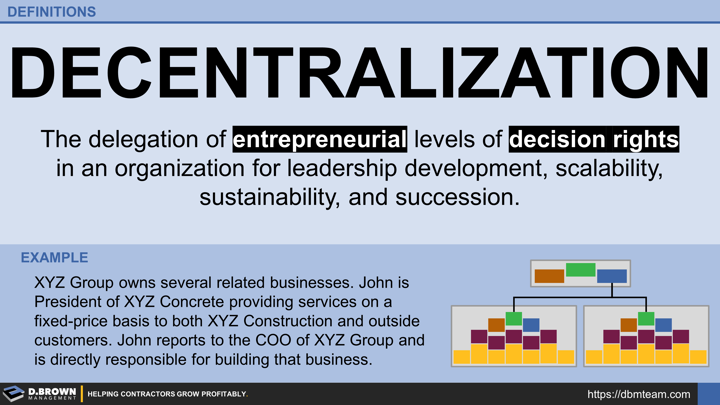Delegation is largely about scaling productivity throughout all levels of a contractor as they navigate different stages of growth. The responsibilities and decision rights delegated are more policy, standards, and procedurally driven.
Decentralization is the next level of that where some or all of the five interlinked questions and decisions about strategy are delegated. This may also include the tailoring of company standards around other parts of the business model including technology to differentiate a part of the business in the market.
Decentralization can be effectively used for leadership development.
EXAMPLE
XYZ Group owns several related businesses. John is President of XYZ Concrete, providing services on a fixed-price basis to both XYZ Construction and outside customers. John reports to the COO of XYZ Group and is directly responsible for building that business.
WARNINGS
- Don't hide behind "decentralization" to avoid the discipline of management which includes setting standards and enforcing them.
- Don't try to decentralize too early. We rarely see decentralization truly work in contractors under a comfortable stage 4 with fully developed management teams. It is usually either highly entrepreneurial leaders or highly production oriented leaders that tend to do this too early, thinking everyone is similar to them in terms of capabilities and desires.
- Don't count on decentralization to create capabilities. Development of people to prepare them for their next role(s) in the company requires as much discipline as effective delegation of responsibilities. Like teaching your teenager to drive, make sure they have the basics down at each level before tossing them the keys to jump on the freeway with five of their buddies and take a two-week trip.
- When managed with discipline, including knowing when to avoid stepping in, decentralization is a great tool for growth and leadership development, but don't try it for the first time during ownership succession.
- Be equally cautious when your first pass at decentralization is combined with geographic expansion.
There are no easy answers to deciding the how, who, when, and to what degree you should decentralize. An experienced and unbiased 3rd party can be invaluable for working through various scenarios.
All relationships begin with a simple conversation - Let's talk

